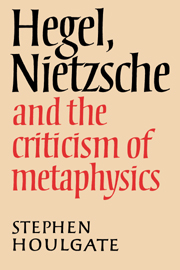Book contents
- Frontmatter
- Contents
- Preface
- Abbreviations and translations
- 1 The Hegel–Nietzsche debate
- 2 Nietzsche's view of Hegel
- 3 Nietzsche and metaphysics
- 4 Hegel and metaphysics
- 5 Speculative thought and language in Hegel's philosophy
- 6 Hegel's conception of the judgement
- 7 Context and the immanence of rationality in Hegel's Phenomenology
- 8 Hegel and Nietzsche on tragedy
- Notes
- Bibliography
- Index
5 - Speculative thought and language in Hegel's philosophy
Published online by Cambridge University Press: 18 November 2009
- Frontmatter
- Contents
- Preface
- Abbreviations and translations
- 1 The Hegel–Nietzsche debate
- 2 Nietzsche's view of Hegel
- 3 Nietzsche and metaphysics
- 4 Hegel and metaphysics
- 5 Speculative thought and language in Hegel's philosophy
- 6 Hegel's conception of the judgement
- 7 Context and the immanence of rationality in Hegel's Phenomenology
- 8 Hegel and Nietzsche on tragedy
- Notes
- Bibliography
- Index
Summary
In his argument against Kant's transcendental idealism, Hegel rejects the idea that there is a dimension of reality – what reality is ‘in itself’ – which cannot be comprehended by the categories and concepts of thought. His reason for doing so is simple, namely that our formulation of the idea of a level of reality which is not accessible to our thought, itself relies (at the very least) on the use of the concept of negation. The concepts with which we think thus constitute for Hegel the determinations of any level of reality we may conceive. We can articulate our perceptions of the empirical world in terms of those concepts; we formulate laws of nature by means of those concepts; and we understand the realm of consciousness and freedom through the use of those concepts. The structure of our thought and language is therefore the structure of our world, and we have no standard of reference by which to judge the truth of the ontology to which our concepts commit us which does not itself rely on those concepts or which cannot at least itself be adequately stated in terms of those concepts.
How, therefore, can we ever hope to achieve true philosophical knowledge of the world? The answer, in Hegel's view, is that we can only achieve such knowledge by employing the right categories; and we can only establish what they are by coming to understand the inherent logical structure of our thought.
- Type
- Chapter
- Information
- Hegel, Nietzsche and the Criticism of Metaphysics , pp. 122 - 156Publisher: Cambridge University PressPrint publication year: 1986

